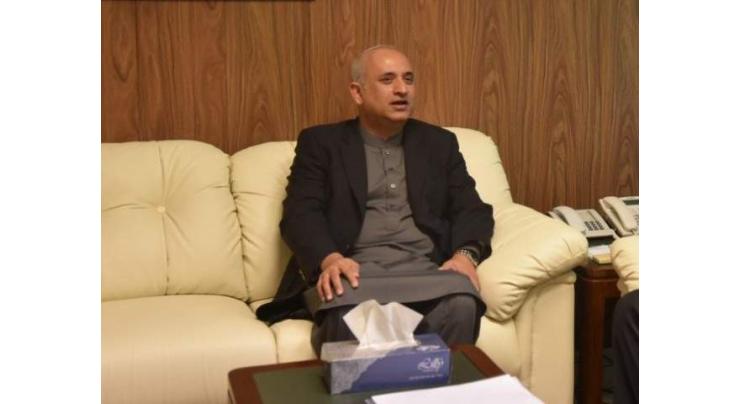
- Home
- Business
- News
- Pakistan's economy back on track due to shift from geo-political to economic led policies: Haroon Sh ..
Pakistan's Economy Back On Track Due To Shift From Geo-political To Economic Led Policies: Haroon Sharif
Mohammad Ali (@ChaudhryMAli88) Published December 05, 2018 | 06:44 PM

Minister of State and Chairman of Board of Investment (BoI), Haroon Sharif here on Wednesday said that due to shift from geo-political and security led policies to economic policies, Pakistan was moving back on track of development and prosperity.
The Chairman BoI said it was important to reflect upon why is South Asia lagging behind capitalizing its true potential of trade, connectivity, and investments. "The opportune time will not come by its own, and we have to create and strive for the right time to move." He said the economies in West Asia, East Asia and beyond is now looking towards us in terms of improved and enhanced economic relations. He also stressed the need to look at Pakistan's capability to handle the demands of the emerging markets.
Sharif said that economic diplomacy has emerged as a major tool in this region for peaceful co-existence and traditional diplomacy is changing rapidly, where narrative is building and the nations are talking about peace and prosperity. After shift in globalization decade, he said, when Brexit is happening in UK and China and Russia are impacting the global economy, the individual countries at regional and sub-regional level start finding new solutions to their economic challenges. He also stressed the need for looking at new economic geography, where Asia, China, west Asia and East Asia are eager to work with each other.
He said that new financial architecture is emerging in the region, such as opening of Asian Infrastructure Bank, Silk Road Fund, China Development Bank and BRIC bank, therefore, there is a need to learn as to how this region can use smartly these resources for growth and prosperity.
At public policy level, Sharif said, there is a very clear realization at political leadership level that the partnerships with key Asian states can be successful only if we ensure transparency and zero-tolerance for corruption.
Former Finance Minister Sartaj Aziz said that China-Pakistan Economic Corridor (CPEC) is a win-win arrangement for both Pakistan and China and all the projects under CPEC must be materialized without any delay, as it would lead to industrialization in Pakistan. He said CPEC is not only a package of road and energy projects, but also a tool of connectivity among think tanks, public and private sector, common people, and ideas. For the successful transformation from trade to knowledge corridor, he said, it is very important to take confidence building measures among all the stakeholders. "The real challenge of 21st century is artificial intelligence and technological upheaval, which took over the physical existence of labour force", he said, adding that however, at the same time, it brings prosperity in the society as a whole.
Aziz maintained that technology is going to transform the job market and the real challenge is how we are preparing ourselves to take up this challenge. He stressed the need to build knowledge corridor under CPEC that, what he said, would help Pakistan bridge the gap between artificial intelligence and technology.
About the issue of climate change South Asia is facing today, he said the real issue is of capacity to tackle the dire implication of climate change. He further said water is an important part of climate change and we need to go beyond building dams, which is water security, water course lining, drip irrigation, and water management. He said that the existing irrigation practices are not compatible which is consuming 60 per cent of our freshwater resources. He said that planning for affordable energy resources is another challenge to tackle and we need to concentrate on agriculture sector which will increase our exports growth and agricultural trade. For that we need to focus on agriculture for next three to four years, he added.
Related Topics
Recent Stories

HEC reviews curricula for environmental sciences degree programme

ICC Asia looking forward to an action-packed Asia Cricket Week

Yuvraj Singh named ICC Men’s T20 World Cup 2024 Ambassador

Greece hands Olympic flame to 2024 Paris Games hosts

Two Kyiv hospitals evacuating over feared Russian strikes

World must act on neurotech revolution, say experts

Charles & Catherine's cancer diagnoses

Champions Alcaraz and Sabalenka through in Madrid Open

King Charles to resume some public duties during cancer treatment: palace

US defense chief announces $6 bn in security aid for Ukraine

Heavy rains cause damage to Spezand-Taftan railway track

Woman stabbed in Israel, attacker killed: police
More Stories From Business
-

Finance minister reviews progress on FBR digitalization
3 hours ago -

US stocks rebound on tech earnings, London hits new record
3 hours ago -

US approves gene therapy treatment for hemophilia
3 hours ago -

KATI president for inclusion of agri sector in tax net
3 hours ago -

Ahsan chairs 13th CPEC-JCC preparatory meeting, reviews arrangements for high-level delegation’s v ..
4 hours ago -

Police to take every step for security of business community: IGP
4 hours ago
-

WB director, Planning minister discuss reforms in development projects
4 hours ago -

IP rights crucial in achieving SDG : Jam Kamal
6 hours ago -

FBR’s data protection efforts commended by OECD assessment team
6 hours ago -

US stocks rebound on tech earnings, London hits new record
7 hours ago -

SECP-IFSB workshop highlights Pakistan's progress in Islamic Finance Development
7 hours ago -

SBP to announce monetary policy on April 29
7 hours ago

















